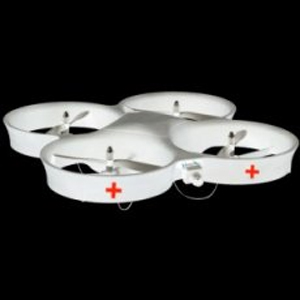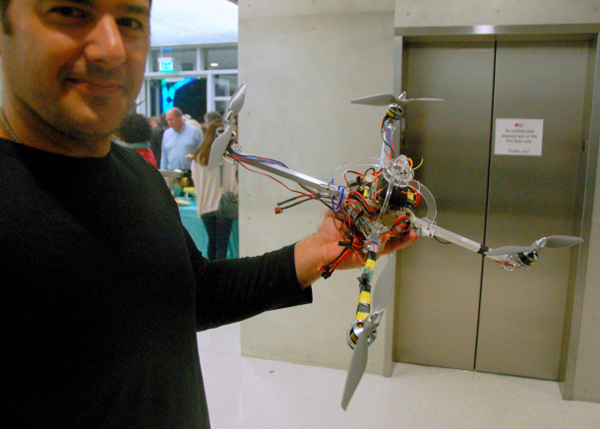At the graduation ceremony of the Singularity University last week, Matternet proposed applying quad-copter technology by building a network of robotic drones to deliver medication quickly and very cost-effectively.
This particular class of S.U. was focused on solving problems for “the next billion people,” those without access to modern technology. Matternet tackled the problem of getting drugs and diagnostic or test materials to people in rural areas in developing countries that don’t have access to passable roads during rainy seasons.
Matternet team leader Andreas Raptopoulos told me the nominal range of his quadcopters is 10 kilometers when carrying a 2-kilogram load (range changes with load). Landing pads act as beacons to augment GPS and guide the copters to precise landings.
The company is building its prototype business around quadcopters, but the Matternet is platform-agnostic. That makes sense, since fixed-wing drones would be faster and have much greater range (but they couldn’t land as precisely).
 In phase two of the company’s rollout, it plans to add automated recharging stations to its networks, both to improve turnaround time and reliability, and to allow the installation of way stations that could swap or recharge batteries automatically to extend the range of the copters. The business is straightforward: Matternet will charge aid companies for delivery services. Currently, Raptopoulos says, the Dominican Republic is financing a pilot project for the company.
In phase two of the company’s rollout, it plans to add automated recharging stations to its networks, both to improve turnaround time and reliability, and to allow the installation of way stations that could swap or recharge batteries automatically to extend the range of the copters. The business is straightforward: Matternet will charge aid companies for delivery services. Currently, Raptopoulos says, the Dominican Republic is financing a pilot project for the company.
The Matternet quad-copters are based on open-source technology from DIY Drones. The automatic control systems and flight programming tools are well-developed, Raptopoulos says. The flying vehicles themselves are custom built, for robustness. They should cost a few hundred dollars each.
Matternet is trying to create, essentially, a modern, long-distance version of the pneumatic tubes that hospitals use to shuttle samples and papers around.
Source: CNet

